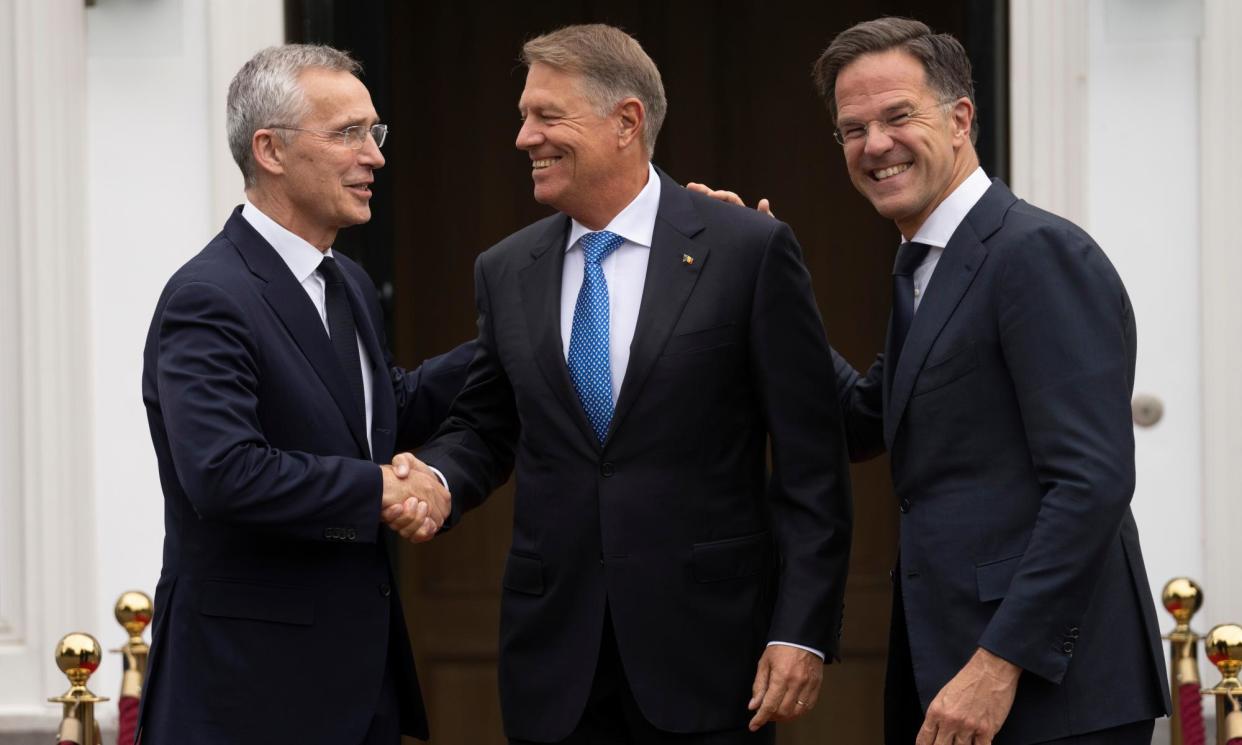Nato should not appoint Mark Rutte without broader discussion, says Latvia

Nato should not appoint the outgoing Dutch prime minister, Mark Rutte, as secretary general without first holding a broader discussion about the alliance’s future challenges, Latvia’s foreign minister has said.
Krišjānis Kariņš’s remarks reflect a feeling among some of the newer member states that they are being railroaded into backing Rutte by the major Nato powers, without a debate about Nato’s future needs.
The Romanian president, Klaus Iohannis, announced this week he was standing for the post, and he is seeking to attract support from frontline states that feel aggrieved at the level of prior consultation before the US, the UK, France and Germany announced their support for Rutte, in what was designed as a fait accompli.
“The peculiarity of the Nato top job is that there is no very clear appointment procedure,” Kariņš said in an interview this week. “We all know that we need to come to a consensus now among 32 states. What has been a little bit lacking is a candid and open discussion about what we are looking for in a leader, and especially, what is the task of that leader. How do we collectively see Nato developing over the four-year term?
“There is a feeling among the new member states – and 20 years is not so new any more – and it seems to be quite universal: is it perhaps the right time to open up the discussion and to look also at these countries as a potential source of a leader? Are our arguments and concerns really being heard or not?”
The newer Nato members, in the Baltic states and eastern Europe, feel they displayed a better analysis of the threat posed by Russia before its full-scale invasion of Ukraine in 2022 and have a superior track record on defence spending.
In line to be the 13th secretary general, Rutte would be the fourth Dutchman to hold the post.
The Nato secretary general is selected in an opaque method known as the “dean’s coffee” – a reference to a meeting convened by the dean of the Nato ambassadors at which consensus is reached over coffee.
Kariņš said: “The odd thing is that this discussion occurs among ambassadors, but the actual decision-makers are the heads of state or governments. Ambassadors, as diplomats, understand the language of opaque discussion. Elected heads of government, and I’ve been around the table, understand the art of direct language and when it’s needed, and I think we need a little bit more of that direct language, just putting things on the table.
“I am absolutely positive it is eminently solvable, but somewhere along the line that discussion is missing.”
Reflecting the need for consultation, Kariņš said: “The secretary general is the person who has to work on the consensual issues and to bring everyone together. That person has to have support among the capitals, but in order to have that support, you actually have to speak with all the capitals.”
Few doubt Rutte’s experience, including his ability to build consensus in coalition government, but his detractors say he was not an early enthusiast for Ukraine’s EU membership, and the Dutch spending defence record – only 1.64% of GDP in 2022 – is a drawback.
Depending on how the numbers are scored, Latvia is by contrast on track to be close to spending 3% of GDP on defence this year.
Kariņš, a possible compromise candidate if no consensus is reached, thinks Nato should develop a 20-year Russia containment strategy, which he said would require boosting the interoperability of Nato weapons.
He said it was impossible to tell how long Russia could withstand its levels of defence spending, but “what is a fact is that Russia is aggressive, and to contain that danger means making Nato visibly strong, which means investing in our defence, and not just for one or two or three years but for the long haul”.
Related: Sweden’s veteran peace movement stung by ‘reckless’ entry to Nato
He admitted it had taken a collective failure to meet the target of providing Ukraine with 1m rounds of ammunition to accept the need to go outside Europe to buy supplies. “Now there is resolve because Ukraine does not have the luxury of waiting for two years as our factories ramp up to a higher production capability,” he said.
He praised the change of heart on buying arms outside Europe by Emmanuel Macron. “The French president’s thinking about the war has evolved,” he said. “In the beginning, he said we need to talk to Putin and provide him an off-ramp and not humiliate him. He then moved to the second stage where actually Ukraine needs to win and then to the third stage, the deep realisation that actually Russia has to lose a war of aggression, or otherwise it will continue to pose a direct threat to European security and French security for a long time to come. He’s now speaking and thinking as a Baltic politician.”
He denied that a perceived hawkishness ruled Baltic politicians out of the Nato post, saying: “Anyone on the eastern flank of Europe has everything at stake to make sure peace lasts, because, God forbid, if there were to be a confrontation militarily between Nato and Russia, it would most likely be over our heads. We would do everything to maintain peace. We don’t view ourselves as hawkish but simply as having our eyes open to the real threat of Russia.”


